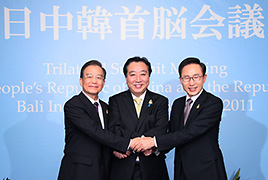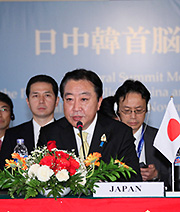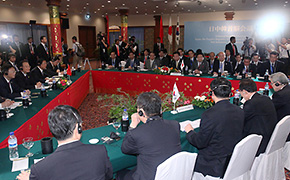Japan-China-ROK Trilateral Summit Meeting (Overview)
November 19, 2011

Group photograph before the Japan-China-ROK Trilateral Summit Meeting
Photograph of Prime Minister Noda speaking at the Japan-China-ROK Trilateral Summit Meeting
Photograph of the Japan-China-ROK Trilateral Summit Meeting
(Photos: Cabinet Public Relations Office)
On November 19, the Trilateral Summit Meeting of Japan, the People's Republic of China and the Republic of Korea (ROK) was held in Bali, the Republic of Indonesia. Among those representing Japan were Prime Minister Yoshihiko Noda (chair), Minister of Economy, Trade and Industry Yukio Edano, and Deputy Chief Cabinet Secretary Tsuyoshi Saito; those representing China included Mr. Wen Jiabao, Premier of the State Council; and the ROK was represented by President Lee Myung-bak and other officials. The following is an overview of the Trilateral Summit Meeting.
1. Trilateral Cooperation
(1) Overview
At the start of the meeting, Prime Minister Yoshihiko Noda expressed his gratitude to the Chinese and ROK leaders for having encouraged disaster-stricken people in Fukushima in person at the time of the Japan-China-ROK Trilateral Summit Meeting hosted by Japan this May and for having extended other support. He also explained that the accident at Tokyo Electric Power Co.'s Fukushima Daiichi Nuclear Power Station was steadily being put under control and that Japan would continue to provide timely and accurate information to China and the ROK, both being Japan's important neighbors. In response, the leaders of China and the ROK expressed appreciation for Japan's efforts made for the May Trilateral Summit. The three leaders welcomed the inauguration of activities by the Trilateral Cooperation Secretariat in September this year.
(2) Cooperation for Disaster Management
Prime Minister Noda expressed pleasure that as a result of the May Trilateral Summit on the strengthening of cooperation in disaster management, a consensus was reached on concrete cooperation, such as making mutual visits to disaster sites, at a Japan-China-ROK ministerial meeting on disaster management in October this year.
(3) Trade and Investment
Prime Minister Noda expressed hope to complete the current industry-government-academia joint study on a Japan-China-ROK free trade agreement (FTA) by the end of this year and to aim at agreeing to start negotiations on the high-level FTA. With respect to the proposed Japan-China-ROK Investment Agreement, for which negotiations are in their final stage after four years of talks, Prime Minister Noda strongly asked for cooperation from the leaders of China and the ROK so that substantial agreement could be reached before the end of this year.
(4) People-to-People Exchange
Prime Minister Noda said the Japan-East Asia Network of Exchange for Students and Youths (JENESYS) had been very fruitful and that following the Great East Japan Earthquake, his government was discussing the implementation of a new youth program running through March 31, 2013. The three leaders welcomed steady progress being made in the Collective Action for the Mobility Program of University Students (CAMPUS Asia) program, a scheme for exchange among universities in the three countries, which had been initiated at Japan's proposal.
2. Regional and International Situations
(1) North Korea
While welcoming the recent efforts such as inter-Korean and U.S.-North Korea dialogues, the three leaders shared the view that it was necessary to continue to urge North Korea to take measures such as an immediate suspension of uranium enrichment activities, as North Korea had not taken such concrete actions yet. Prime Minister Noda stated that it was extremely important for North Korea to express its serious intention, through its concrete actions, toward its denuclearization and the improvement of inter-Korean relations. He also expressed his gratitude for the cooperation of the two leaders toward the resolution of the abduction issue and asked for their further cooperation on this important issue.
(2) International Economy
With respect to the global credit unrest brought on by the European debt crisis, Prime Minister Noda said financial stability and a framework for problem solution were important and that he hoped to cooperate closely with China and the ROK so that the debt crisis would not spill over to Asia. The three leaders shared the recognition that it was important for countries to steadily implement the Cannes Action Plan and that Japan, China and the ROK would each appropriately perform their necessary roles.
(3) Climate Change
Prime Minister Noda said that at COP17, it was important to advance discussions toward the final goal of building a fair, effective and legally binding international framework in which all major countries would participate.
3. Following concluding remarks by Premier Wen and President Lee at the end of the meeting, Prime Minister Noda said the Trilateral Summit Meeting had entered the second round of sessions this year in the present form of each meeting hosted by one of the three countries in turns, adding that the Summit was growing in importance, as evidenced by the establishment of the Trilateral Cooperation Secretariat. He expressed hope to consult closely with China, which would chair the Summit next year, toward its success.
Back to Index
